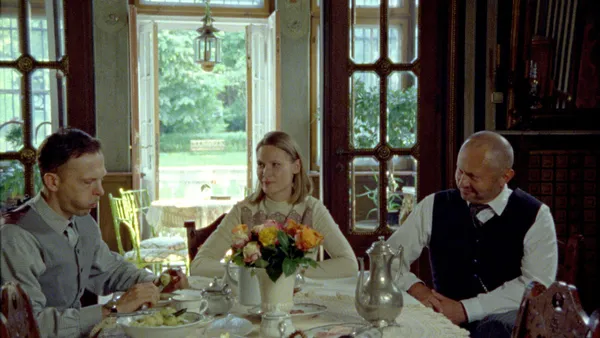Eye For Film >> Movies >> The Assistant (2025) Film Review
The Assistant
Reviewed by: Anne-Katrin Titze

Wilhelm Sasnal and Anka Sasnal’s highly original, capriciously sumptuous adaptation of Robert Walser’s The Assistant, (Czlowiek Do Wszystkiego, a highlight of the 54th edition of Film at Lincoln Center and Museum of Modern Art’s New Directors/New Films), screenplay by Wilhelm Sasnal, begins unlike the 1908 novel in a kind of present in which the protagonist Joseph Marti (Piotr Trojan) attempts to bind a book in a workshop. It doesn’t go well, he gets fired, and a friendly unemployment officer (Roman Gancarczyk, who has a Da Vinci on his wall, painted by Wilhelm Sasnal) suggests a job as assistant to the inventor Tobler (Andrzej Konopka), who lives with his wife (Agnieszka Żulewska) in a beautiful villa out of town. “Why have you come today” is his greeting. Too early, too eager the new employee seems to be. This foreboding first encounter is where Walser (who was greatly admired by Franz Kafka) begins his book about servitude and disobedience, hospitality and social norms too mystifyingly strange to ever really make sense.
While journeying by train to his new employment, Joseph, and we with him, experience a mellow time travel, very elegantly and organically dropping us off in a porous world that resembles various periods of the past and present at once. Like a palimpsest, layers of history shine through the sunlight on the garden and lurk in the shadows of the parlour. The extensive use of compositions by Gustaf Dicksson’s Blod for the soundtrack underscores the dream-like traits of the story.

Joseph who hasn’t eaten in a while is offered all the food he desires, plus cigars, but payment will forever be delayed. The business of inventing isn’t flourishing lately. He witnesses his predecessor, Wirsich, being thrown out for drunken behavior, not before we see him perform an exulted and exhausting dance on the balcony to the song I Don’t Owe You Anything by The Smiths. Besides the paintings resembling Picassos or Braques on the walls of the mansion, Sasnal also painted his version of The Smiths’ debut album cover, which finds its place in the servant’s chamber. Characters study the artworks carefully, maybe slightly puzzled, as though they were policemen in a Hitchcock movie, inspecting the villa of Cary Grant and Joan Fontaine in Suspicion, or what the easel holds in Strangers On A Train.
Mrs. Tobler, always elegantly dressed, with a fence of rosy lace on her high-necked cream coloured top, has her fingernails painted black. There is more to her than a first glance tells. Though she doesn’t offer much to their daughter, Silvi (Suzanne Lasota), and hands most of her care over to the uncaring maid (Aleksandra Nowosadko). “The very sight of her is repulsive to me,” is not what mothers often speak out loud about a child. She prefers to read, as does Joseph, who finds it more and more complicated to figure out what his job truly entails, while being stuck perpetually between inside and out, a part of the household or underneath it.
How do people live? How do they earn a living? Though Walser’s protagonist in the novel is especially concerned at the start that he may not have actually earned what food and lodging he is getting, the Sasnals’ hero with increasing dread fears that this would be all he’ll receive, with no prospect of a salary. Patiently waiting, the only things he has are the enchanting surroundings, and the experience of what resembles more and more that of indentured servitude. Shots of the expansive estate (Wilhelm Sasnal is also the cinematographer), make you want to linger on the compositions. An inquiring emotional through line connects where logic leaves gaps for the mind to wonder.
Boys rattle around the countryside with cans tied to their bikes. Joseph reads Camus and travels back to the city to visit an old flame, who turns out to be the seamstress making Mrs. Tobler’s new dress. The sleeves of the copper-coloured silk slip are too tight, she complains about the ridiculously wide butterfly cut. Joseph will wear the gray suit he inherited from Tobler, because you do not turn down a gift. There is a postmaster (Anka Sasnal) and the owner of the local tavern (Ewa Kolasińska), both watching curiously the goings-on in the villa. Tobler’s inventions, a clock with advertisement opportunities and a can opener, attract potential customers who react with laughter and threats.
A party by strobe light makes zombies out of the participants. When a mysterious man with red eyes arrives, he was actually sent from the power company to cut off electricity. What is a good assistant to do? He can help write a letter to Tobler’s mother to ask for money. He can dance, as if a barroom brawl broke out in Tobler’s office, to ESG’s Dance [produced by Ed Bahlman, founder of 99 Records] with his boss and two strangers whose intentions are unclear. It turns out, he can also see things to come, predict wars, and the success of one of the inventions.
“A humiliated man will never be of any use,” he knows and goes on his way into a future that will see many, many more of his kind.
Reviewed on: 27 Apr 2025














